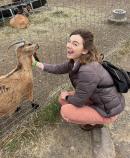People
Faculty

Franz Weber
Assistant Professor
fweber@pennmedicine.upenn.edu
I've started my scientific career with flies and how they compute motion from moving images. Working on sensory processing, I've realized how much the activity of sensory neurons depends on the actual state of the animal. This realization triggered my interest in brain state modulation and more generally, how the brain spontaneously, on its own, slowly changes its global state. In other words, my interest has turned from how the brain represents external stimuli, to how the brain spontaneously behaves on its own without any input. And, in my opinion, the ultimate spontaneous brain activity is REM sleep: While we are asleep, regularly, about every 90 min, large regions of the brain stem and specific forebrain areas suddenly become highly active and we have only vague ideas why this happens.
Postdoctoral Fellows

Jiso Hong
Jiso is interested in the neural circuits regulating behavioral deficits expressed in various psychological disorders. During the graduate school in KAIST, she studied the role of the medial prefrontal cortex in chronic stress and fear extinction, well known models for mood disorder and PTSD. At Penn, Jiso wants to investigate how sleep is associated with these psychological disorders and underlying neural circuits.

Xi Jin
Xi is focused on understanding the principles of neural circuits regulating sleep behavior. He studied the neural pathways and underlying molecules which integrate environmental inputs to regulate sleep in Drosophila during his doctoral studies at Southeast University, China. At Penn, Xi wants to answer how sleep is initiated and maintained in rodents. What is the first trigger of the synchronized oscillations spanning the brain in sleep behavior? How are these oscillations controlled and how do they change throughout sleep?
Graduate students

Emily Pickup
NSF Graduate Research Fellow (NGG)
Emily is interested in the ways sleep biology impacts behavior. She graduated from the University of Michigan in 2018, where she studied replay as a mechanism for sleep-dependent memory consolidation. Before starting at Penn, she worked as a preclinical research associate at Alkahest, a biotech company developing therapeutics for diseases of aging. She was looking at how these therapeutics might renormalize sleep patterns in elderly individuals. At Penn, Emily will use electrophysiology, circuit tracing, and behavioral methods to study how REM-related brain activity impacts physiology and behavior.

Zhuowen (John) Yin
Graduate student (Bioengineering)

Joel Woolley
Graduate student (NGG)
Undergraduate Researchers

Matthew Kim
Undergraduate Researcher
Matthew is a sophomore studying neuroscience at the University of Pennsylvania with a strong interest in the mechanisms of anesthesia. Through the Weber Lab, he hopes to explore the intricate relationships between neurotransmitter receptors, REM sleep, and anesthesia.

Sophia Ho
Undergraduate researcher
Alumni
Justin Baik, Inscopix
Brenna Shortal (NGG rotation student)
Stephanie Acquaye, Hillman Scholars BSN-PhD Program at Penn
Joe Stucynski, Neuroscience Graduate Group (NGG) at Penn
Benjamin Kurland, Whiting School of Engineering, Johns Hopkins
Sungho Park, Minds and Co.
Zachary Spalding, Biomedical Engineering Graduate Group, Duke
Martha Stone (NGG Rotation student)
Camille Harrison, UPenn
Fiona Stauffer, Medical School, U Pitt
Fernanda Holloman (NGG, rotation student)
Diana Youngstrom (NGG, rotation student)
Mandy Schott, postdoctoral fellow, Harvard
David Lozano, senior scientist at Genentech
Leilei Hao, Medical School, U Penn
© The Trustees of the University of Pennsylvania | Site best viewed in a supported browser. | Report Accessibility Issues and Get Help | Privacy Policy | Site Design: PMACS Web Team.
